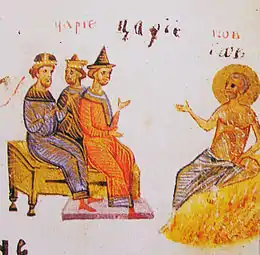
In the Hebrew Bible/Old Testament Book of Job (c. 6th century BCE?), Zophar (Hebrew: צוֹפַר Ṣōp̄ar, "chirping; rising early"; also Tzofar) the Naamathite is one of the three friends of Job who visit to comfort him during his illness. His comments can be found in Job 11:1–20 and Job 20:1–29. He suggests that Job's suffering could be divine punishment, and goes into great detail about the consequences of living a life of sin.
"Naamathite" (na'-a-ma-thit) is a Gentile name,[1] suggesting he was from a city called Naamah, perhaps in Arabia.
Speeches
Unlike friends Bildad and Eliphaz, Zophar only speaks twice to Job. He is the most impetuous and dogmatic of the three. Zophar is the first to accuse Job directly of wickedness; averring indeed that his punishment is too good for him (Job 11:6), he rebukes Job's impious presumption in trying to find out the unsearchable secrets of God (Job 11:7–12); and yet, like Job's other friends, he promises peace and restoration on condition of penitence and putting away iniquity (Job 11:13–19).[2] Zophar's second speech is a lecture on the fate of the wicked, ending with a summary appraisal in the style of his friend Bildad,
This is the portion of the wicked, the heritage appointed him by God.[3]
See also
References
- ↑ "www.Bibler.org - Dictionary - Naamathite". Archived from the original on 2016-11-04. Retrieved 2020-02-17.
- ↑ "www.Bibler.org - Dictionary - Zophar". 2012-08-28.
- ↑ Job 20:29, cf. Job 18:19 and footnote b at Job 20:29 in the New American Bible Revised Edition
Attribution
![]() This article incorporates text from a publication now in the public domain: Easton, Matthew George (1897). "Naamathite". Easton's Bible Dictionary (New and revised ed.). T. Nelson and Sons.
This article incorporates text from a publication now in the public domain: Easton, Matthew George (1897). "Naamathite". Easton's Bible Dictionary (New and revised ed.). T. Nelson and Sons.